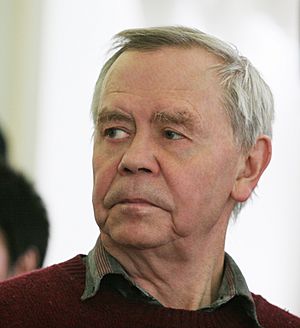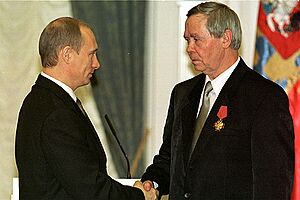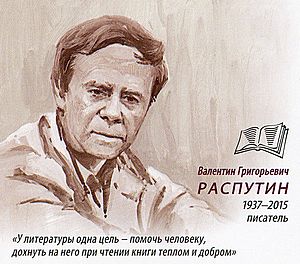Valentin Rasputin facts for kids
Quick facts for kids
Valentin Rasputin
|
|
|---|---|

Rasputin in 2011
|
|
| Born | Valentin Grigoriyevich Rasputin 15 March 1937 Atalanka, Irkutsk Oblast, Russian SFSR, Soviet Union |
| Died | 14 March 2015 (aged 77) Moscow, Russia |
| Alma mater | Irkutsk State University |
| Genre | Fiction |
| Notable works | Farewell to Matyora |
Valentin Grigoriyevich Rasputin (/ræˈspjuːtɪn/; Russian: Валентин Григорьевич Распутин; 15 March 1937 – 14 March 2015) was a famous Russian writer. He was born and lived most of his life in the Irkutsk Oblast in Eastern Siberia. Rasputin's stories often showed people living in cities and how old village traditions were changing. He explored big ideas about right and wrong, and how people could find meaning in their lives.
Contents
About Valentin Rasputin
Valentin Rasputin was born on March 15, 1937, in a village called Ust-Uda in the Irkutsk Oblast of Russia. His father, Grigory Rasputin, worked for a village shop, and his mother was a nurse. Soon after he was born, his family moved to the village of Atalanka in the same area, where Valentin spent his childhood.
Both of these villages used to be on the banks of the Angara River. However, they no longer exist in their original spots. This is because the Bratsk Reservoir was built in the 1960s, and it flooded much of the Angara Valley. The villages had to be moved to higher ground.
When Rasputin finished elementary school in Atalanka in 1948, his parents sent him to middle school and then high school in Ust-Uda. This town was about 50 kilometers away from his home village. He was the first child from his village to continue his education in this way.
Rasputin graduated from Irkutsk University in 1959. After that, he started working for local newspapers in Irkutsk and Krasnoyarsk. He published his very first short story in 1961.
A big moment in Rasputin's early writing career happened in September 1965. He attended a seminar for young writers in Chita. A writer named Vladimir Chivilikhin (Владимир Чивилихин) led the seminar. Chivilikhin encouraged Rasputin's writing dreams and suggested he join the important Union of Soviet Writers. Because of this, Rasputin always thought of Chivilikhin as his "literary godfather," meaning he helped him a lot with his writing.
In 1967, after his book Money for Maria was published, Rasputin officially joined the Union of Soviet Writers. Over the next 30 years, he published many novels. Many of these books became very popular with Russian readers and were praised by critics.

In 1980, after two years of studying the Battle of Kulikovo, Rasputin was baptized by an Orthodox priest in a nearby town called Yelets.
Rasputin's writing was closely linked to his work on social and environmental issues. During the 1970s and 1980s, some people called Rasputin a leader in the "Siberian environmental lobby." He actively worked to protect Lake Baikal and spoke out against plans to move Siberian fresh water to Central Asian countries. In the 1990s, he was part of a movement that supported Russian national pride. He spent most of his adult life in Irkutsk and remained one of the most important thinkers in this Siberian city.
He attended many events in Irkutsk, like the unveiling of statues for Tsar Alexander III, Alexander Vampilov, and Alexander Kolchak. He also organized reading events at the Irkutsk Central Scientific Library.
Sadly, Rasputin's daughter Maria died in a plane crash in 2006. His wife passed away six years later. Valentin Rasputin himself died in Moscow on March 14, 2015, just one day before his 78th birthday. Patriarch Kirill of the Russian Orthodox Church led his funeral service, and President Vladimir Putin also came to pay his respects. (In 2014, Rasputin had signed a letter with other writers supporting Putin's actions in Crimea.)
Rasputin's Style of Writing
Rasputin is well-known for being part of a writing style in Soviet literature called "village prose" or "rural prose." This style of writing became popular during a time of change in the Soviet Union. It was praised for being different from the usual "socialist realism" writing style.
Village prose stories often focused on the difficult lives of farmers in the Soviet Union. They often showed an ideal picture of traditional village life. These stories also quietly or openly criticized official plans to modernize the country. Rasputin's 1979 novel Farewell to Matyora is a great example of this style. It tells the story of a made-up Siberian village that must be moved and cleared. This is so a hydroelectric dam can be built further down the Angara River.
Rasputin's non-fiction books also had similar themes. He often wrote to support important political causes. He was very critical of large dam building projects, like the one that flooded his own hometown. He also spoke out against water management projects, such as moving Siberian rivers to Central Asia. He believed these projects were harmful not just to nature, but also to people's morals and way of life.
In his book Siberia, Siberia (first published in 1991), Rasputin compared what he saw as modern ideas about right and wrong with the old beliefs of the people of Russkoye Ustye. These people believed in reincarnation, which is the idea that a soul can be reborn into a new body. Rasputin wrote that when the Russkoye Ustye settlers buried their dead, they would often make a hole in the coffin. This was to make it easier for the soul to come back and be reborn. But if the person had been bad, they would drive a stake made of aspen wood through the grave. This was to stop their soul from ever coming back into the world of the living.
Some critics thought Rasputin made village life seem too perfect. They also said he was against modern progress. A journal called Voprosy literatury even had a long discussion about whether Rasputin's "Village Prose" was "Anti-Modern."
Rasputin's Political Views
Towards the end of the perestroika period (a time of big changes in the Soviet Union), Rasputin became very active in public life. He criticized the reforms of Mikhail Gorbachev. He did this from a position of patriotism and national pride. He famously repeated a quote from Pyotr Stolypin: "You need great upheavals. We need a great country." This phrase became popular among those who opposed liberal ideas.
He also signed several open letters. One of the most notable was the "Letter of Russian Writers" (also known as the "Letter of Seventy Four"). This letter was sent to the President and the Supreme Soviet of the Soviet Union. It was published in newspapers like Literary Newspaper and Nash Sovremennik in 1990. In the letter, 74 writers expressed worry about negative views of Russians in the media. The letter also mentioned concerns about the idea of "Russian fascism" being created. Some opponents criticized this letter. Rasputin himself said that any claims of him being against certain groups were taken out of context. In July 1991, Rasputin and 11 other public figures signed another open letter called "A Word to the People."
In 1992, Valentin Rasputin joined the National Salvation Front. This was a group of strong opposition forces. He was part of its leadership. Later, he supported the CPRF and its leader, Gennady Zyuganov.
Awards and Honors
- USSR State Prize, 1977. He received this award for his novel To Live and Remember. This book was about a soldier who left the army during World War II.
- Order of Lenin, 1984
- UNEP Global 500 Roll of Honour, 1988.
- Solzhenitsyn Prize, 2000
Books Made into Movies
Many of Valentin Rasputin's stories and novels have been turned into movies and TV shows:
- 1969 — Rudolfio, directed by Dinara Asanova (based on his story)
- 1978 — French Lessons, directed by Yevgeny Tashkov (based on his story)
- 1979 — Money for Maria, directed by György Lengyel (Hungary) (based on his story)
- 1980 — The Last Frontier, directed by Timo Bergholm (Finland) (based on his novel The Last Term)
- 1980 — Meeting, directed by Alexander Itygilov (based on his story)
- 1980 — Selling Bear Fur, directed by Alexander Itygilov (based on his story)
- 1981 — Farewell, directed by Elem Klimov (based on his novel Farewell to Matyora)
- 1983 — We Live and Love from the Special Case anthology, directed by Valery Pendrakovsky (based on his story)
- 1981 — Vasily and Vasilisa, directed by Irina Poplavskaya (based on his story)
- 1985 — Money for Maria, directed by Vladimir Andreev, Viktor Khramov (based on his story)
- 1987 — Farewell, Little Island, directed by Sándor Reisenbüchler (Hungary) (based on his novel Farewell to Matyora)
- 1991 — Rudolfio, directed by Vasily Davidchuk (based on his story)
- 2008 — Live and Remember, directed by Aleksandr Proshkin (based on his novel)
See also
 In Spanish: Valentín Rasputin para niños
In Spanish: Valentín Rasputin para niños
- Village Prose
 | Delilah Pierce |
 | Gordon Parks |
 | Augusta Savage |
 | Charles Ethan Porter |


